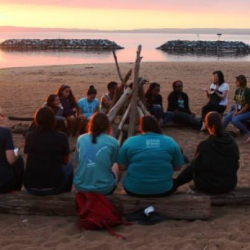A Dynamic, Diverse Professional Scientific Society
In 2019, a working group of ESA Governing Board members under the leadership of then President-elect Osvaldo Sala worked on defining the core statements and values of the Society, and on developing strategic goals through 2022. These were endorsed by the Governing Board in May 2019 and shared with the membership at the Annual Meeting. Concurrently, a separate subcommittee of the Governing Board led by then-Vice President for Finance Evan DeLucia worked on the process to reform ESA’s internal governance, and worked with the ESA Council to redefine the core governing documents of the Society. In the 2019 ESA election, members voted overwhelmingly to dissolve the old constitution and adopt a new set of bylaws, which were approved by Council and formally took effect on March 1, 2020.
These changes, while not insignificant, primarily addressed the foundation of our governance. The governance subcommittee continues its work to further evolve ESA’s governance to increase transparency, give a voice to all members and support the goals laid out in the strategic plan.
A Diverse Society
As calls for social and racial justice echoed around the world in 2020, ESA rapidly responded to the call for racial justice by publicly declaring our support for BIPOC (Black, Indigenous and People of Color) ecologists, holding listening sessions with the membership and forming a task force on diversity, equity, inclusion and justice in ESA. This group made recommendations to the Governing Board that were unanimously endorsed, and the task force’s work continues as the focus shifts to implementation and sustainability. ESA also continues to enforce a strong code of conduct for events and will not condone any forms of harassment. These actions were highlighted in a poster at the Annual Meeting.
Student Programs
Through programs like SEEDS and EcologyPlus, ESA has long supported the participation of diverse people in both the science of ecology and our Society. It became clear in 2020, though, that even more work needed to be done, and the Governing Board pledged to redouble our efforts to build a truly inclusive organization. The DEIJ Task Force that was formed as a result is making great progress; in the meantime, we encourage all ESA members and anybody in our community to review and think about how to use this resource bank on building DEIJ.

Our members have vigorously embraced and demonstrated this commitment over the past several years. After the successful program to provide financial support to members who lacked institutional support to attend the 2019 Annual Meeting, we raised funds to do so again in 2020. We ultimately provided registration grants to more than 300 Annual Meeting attendees, supported by the ESA Opportunity Fund, the Les Real and Jim Brown Student Travel Award, and other contributions from our sections and chapters. A fundraising campaign at the end of the year focused on replenishing the Opportunity Fund to continue to provide these grants for 2021, and a group of 27 ESA past presidents stepped up to contribute $20,000 in matching gifts. In addition, an anonymous donor contributed $10,000 to the Henry L. Gholz SEEDS Field Trip Endowment over the summer as part of a matching campaign that members enthusiastically supported.
SEEDS
While pandemic conditions prevented our normal support of the SEEDS program’s field trips and other activities, we nonetheless continued to grow — with two new chapters started in 2020, there are now 115 across the United States. All are now going to be supported by the generous financial gift from Vicki Moore in memory of her daughter, Kendra Chan, who was a SEEDS leader at UC Davis. The gift has enabled ESA to hire a new part-time diversity programs assistant who will work to expand our chapter grants program and encourage collaborative projects among SEEDS chapters.
On Nov. 12, 2020, SEEDS hosted a panel discussion by a diverse group of ecology professionals from academia to consulting. We learned about their jobs and their journeys as each panelist offered a unique perspective on a different career path.
EcologyPlus
The EcologyPlus collective impact alliance led by ESA nimbly adjusted its work through the coronavirus pandemic by offering a series of webevents that provided support and networking for young underrepresented minority scientists and professionals in ecology and the environmental sciences. Throughout 2020, partners in the alliance also actively sought to address the fourth cornerstone of EcologyPlus, institutional barriers and bias in recruitment and retention of minorities. We held a forum of human resources and /or diversity and inclusion personnel from key environmental nonprofits and further met in working groups to develop strategies to engage employers, and then held a virtual meeting on networking for career advancement.